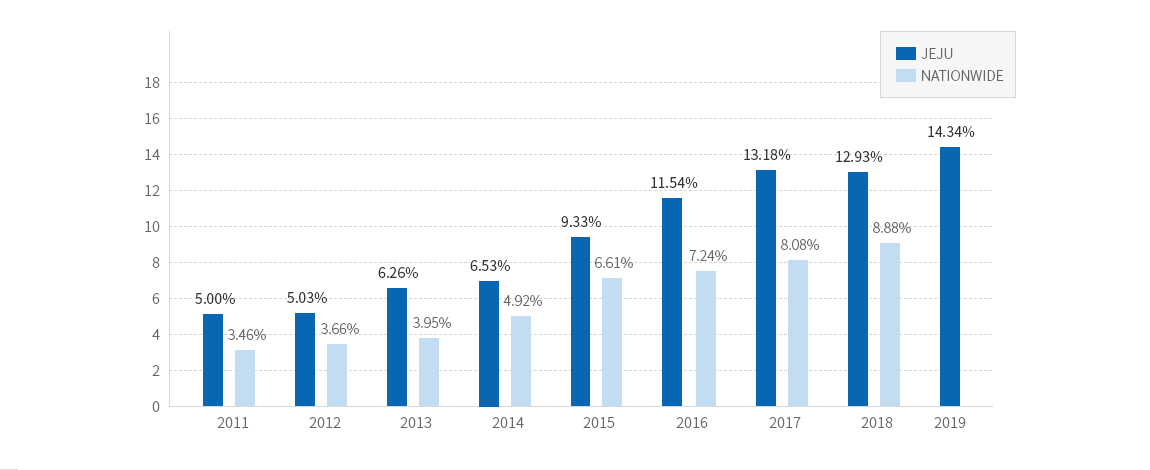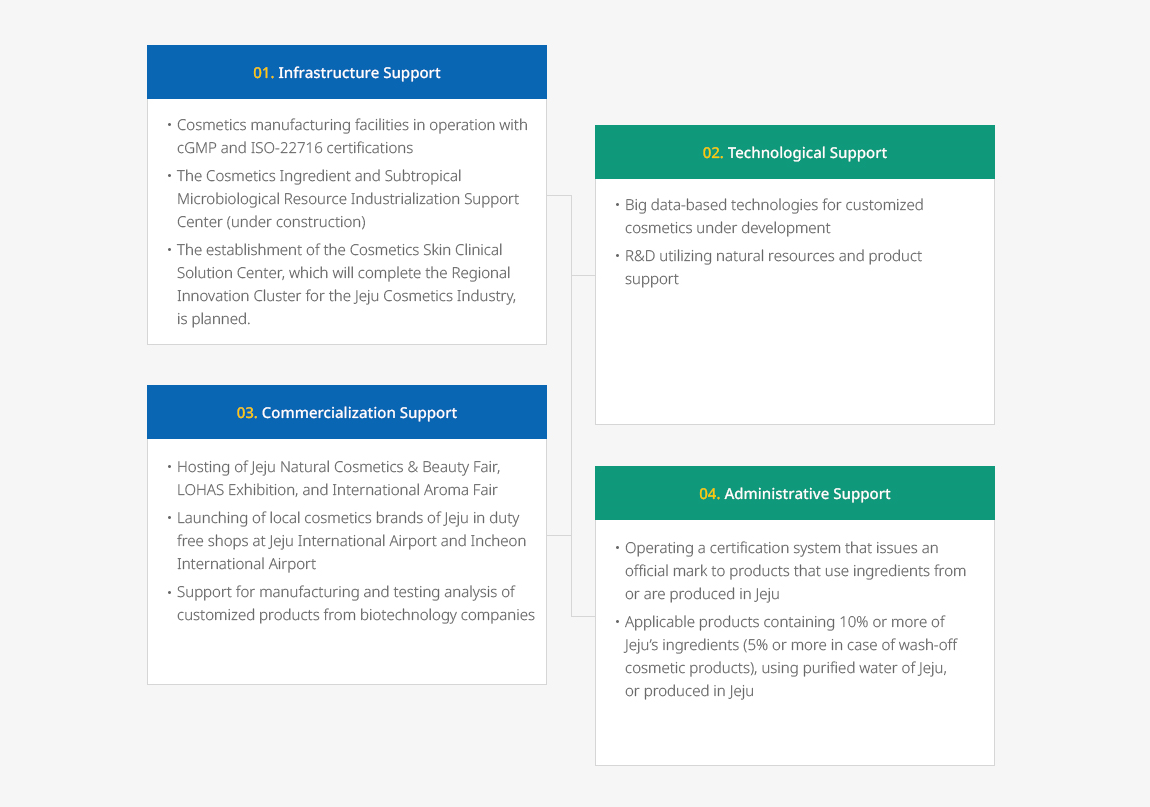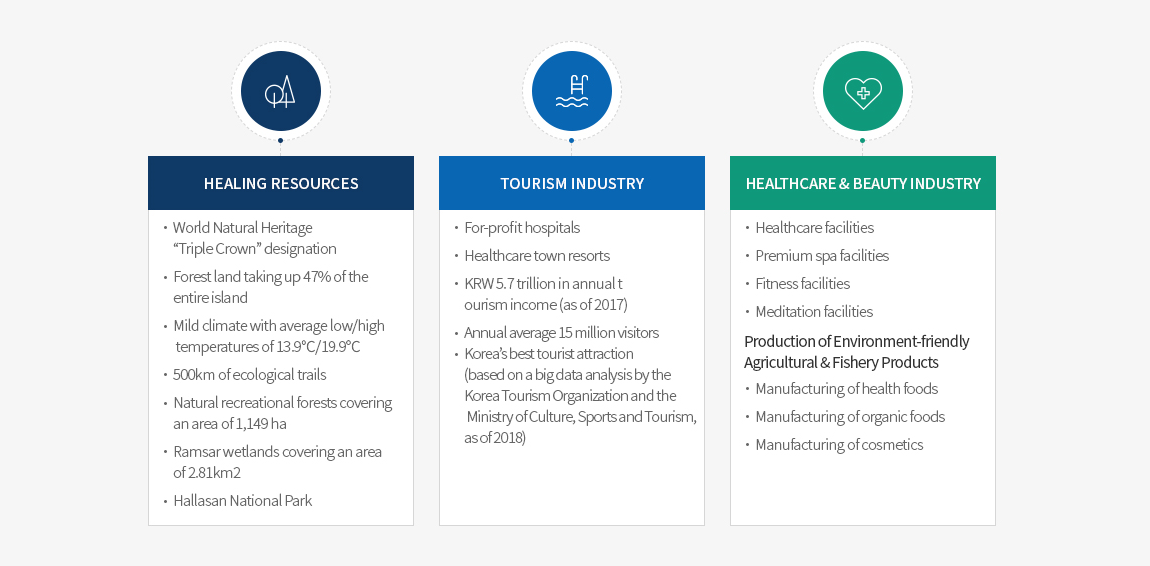e-jejutrade, The Best Partner for your Corporation's Success
제주전자무역지원시스템(E-Jejutrade_en)
In accordance with its Carbon-Free Island 2030 Project, Jeju Island is committed to fulfilling all of its energy needs using renewable energy sources by 2030.
About 75% of transportation vehicles will be replaced by electric vehicles to reduce greenhouse gas emissions and achieve energy self-sufficiency in response to the new climate system.
Leadership in citywide electric vehicle implementation and the strong winds reflecting the island’s natural environment are the biggest resources that Jeju Island has in terms of the green energy industry.
In addition, Jeju is well positioned to adopt new technologies and initiate resident-led projects, which makes the island a leader in global initiatives for reducing greenhouse gas emissions.
The journey of Jeju Island towards being a world-class green growth model is full of new business opportunities
 Proportion of renewable energy to total power production (2011 ~ 2019)
Proportion of renewable energy to total power production (2011 ~ 2019)
Electric vehicles have evolved into mobile energy storage systems and high-performance computers, reaching beyond simple means of transportation.
The EV business has converged with autonomous driving technologies, renewable energy, and others to lead the Fourth Industrial Revolution.

The cosmetics industry utilizing natural resources extracted from Jeju’s clean and unique vegetation environment continues to see an increase in output, industrial scale, and sales every year based on its continued administrative and financial support.
This industry has a solid value chain that is comprised of the procurement of cosmetic raw materials, production, and distribution, as well as high-quality research facilities.
Jeju Technopark has published a directory of natural raw materials from Jeju by classifying those cosmetic ingredients registered in the International Cosmetic Ingredient Directory (ICID), and launched Jeju Cosmetic Certification to enhance the value and competitiveness of cosmetics produced in Jeju.
Jeju itself has long been a renowned brand in East Asia. Therefore, a bio and cosmetics ingredient industry armed with the “Clean Jeju” brand has unlimited possibilities.

Jeju’s Smart Island strategies integrate conventional industries with digital technologies to preserve nature while at the same time transforming the island’s economic, social, and ecological structures in line with the era of the Fourth Industrial Revolution. The strategies are aimed at resolving urban issues through the analysis of big data, improving the quality of life of residents through data-based automation and streamlining, and pursuing sustainable changes and innovation. They are also aimed at commercializing drone-based administrative services and easing regulations in fields requiring innovation, thereby finding shortcuts to a future city. The Smart Island strategies promote the “Civic Hacking” and “Living Lab” movements based on massive amounts of data, and drive active participation and interaction of civil society to achieve an innovative digital society and deliberative democracy. In addition, the physical isolation and reduced radio wave interference of the island, as well as its unique strength as the country’s largest tourist destination attracting 15 million visitors every year, will help the Smart Island policy bear the fruit of innovation.
Modern people, who are exposed to a great deal of stress and different diseases, are increasingly interested in healing and healthcare, and the size and value of the global wellness market continues to grow.
Jeju Island has developed outstanding facilities for high-quality medical services including, forest healing, beauty and anti-aging, aesthetics and spa, healing and meditation, and fitness and leisure, based on its pristine natural environment and excellent tourism infrastructure, and promoted the food ingredient production and processing industry based on primary industries.
The island, which has driven a healthy lifestyle among Korean consumers, is an ideal location for investment in the wellness tourism industry as it is located just one-hour away from both China and Japan, which have Asia’s largest silver economies and healthcare markets.
Furthermore, the Special Act on the Establishment of Jeju Special Self-Governing Province and the Development of the Free International City allows foreign corporations to establish medical institutions in Jeju. Healthcare town Healing Hills, developed by JDC and located in Seogwipo City, is attracting investment with an aim to become a world-class medical tourism complex.

Jeju Island has one of the most recognizable brands as a pristine natural environment in Asia and a world-class recreational tourism industry. In this respect, the sustainable primary industry of Jeju is a promising future industry full of potential.
High-quality agricultural, marine, livestock, and water resources abundant on the volcanic island have been popular among Asian consumers, including both Chinese and local consumers.
The environment-friendly brand development, which transforms pristine ingredients into products with high value added, and rural tourism combined with the island’s outstanding tourism infrastructure are expected to give Jeju Island a differentiated value proposition.
Today, our society is witnessing changes to existing industrial structures and the ways of business operation as well as to our daily lives due to climate change and environmental degradation. In response, increasingly higher numbers of conscious consumers are trying to prevent the reckless waste of resources and instead consume environmentally friendly products. The sentiment is also growing that businesses should focus more on environmental protection and assume social responsibility.
Recently, more businesses in Jeju have striven to adopt new business models to meet the demands of such consumers and secure a share of the ethical consumption market. This is because the environmental and social responsibility of businesses constitutes a prerequisite for sustainable management and a new competitive edge in this era of climate change.
Jeju Island, which achieved UNESCO’s coveted “triple crown” and gained high recognition in the Asian market, will be an ideal location for investment for environmentally conscious and ethical businesses.
“Recycling for Rebirth”
Jeju Recycling System Development Project
Pleats Mama, making an eco-friendly bag with sisteen 500-milliliter Samdasoo PET bottles
Korean recycling brand Pleats Mama has worked together with Hyosung TNC and Jeju Island to manufacture Korea’s first recycled products made from 100% Jeju Samdasoo PET bottles, drawing attention from the market.
The “Recycling for Rebirth” project aims to build a resource recycling system in the Jeju area. Hyosung TNC, which posesses technology for producing recycled polyester fabric, turns reclaimed Jeju Samdasoo PET bottles into a recycled fabric named Regen Jeju. Then, eco-friendly bag manufacturing startup Pleats Mama produces end products using the recycled fabric.
※ Regen Jeju: Korea’s first recycled polyester made from 100% PET bottle waste in Jeju
※ Creora Regen: World’s first 100% recycled spandex